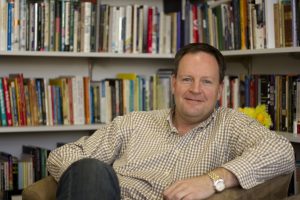Partner Spotlight:
Andrew Menzies
The Doctor of Ministry program here at the GST was approached by Stirling Theological College in Australia about the possibility to partner with them to provide Australian seminarians with the opportunity to complete a D.Min. Through the months after that initial conversation, the GST and Stirling have been working together to propose and build a program that fills this niche. Today, we are excited to introduce you to Dr. Andrew Menzies, president of Stirling Theological College, as we welcome him into the ACU fold and prepare to launch this partnership. Andrew taught a D.Min. course with us this summer and looks forward to fully launching this partnership with our 2020 D.Min. cohort. Enjoy.
Andrew, tell us about yourself.
I’m married to Kim and we have twins (a boy and a girl) who are teenagers. I was born and bred in Melbourne which is a multicultural city of over 5 million people in the south-east of Australia. I’ve been a minister/pastor for almost 30 years in a range of contexts. I have been a generations pastor of over 1000 young people in a mega church, a rural school chaplain, a senior minister of a renewing inner-city church and am now in my tenth year as president of Stirling College. In that time period I also completed four degrees, culminating in a Doctor of Ministry.
For recreation I love real sports (!) like Australian Rules Football and Cricket as well as bushwalking, gardening, and I’m addicted to reading: history, biography, current events, and literature. Also, I draw a little and get hopelessly lost wandering through art galleries. Opportunities for celebrating God’s creativity are wonderfully renewing for me, whether done by me or by others.
What does your ministry context look like in Australia and how do you prepare ministers for it?
Stirling College is the national seminary for Churches of Christ in Australia which has about about 500 churches of all shapes and sizes. Our college is also one of 11 colleges that comprise the University of Divinity, Australia’s only university that specializes in theology, ministry, and associated disciplines.
Minister formation and the role of colleges has changed rapidly in the last couple of decades. Twenty years ago it was standard for a prospective ministry candidate to attain a theology degree (either a M.Div. or a B.Theol.). These days most ministry folk are called to a role in a church and then come to us and want to value-add to their ministry with some educational formation. We offer standard campus based courses as well as online and hubs. We also offer awards in counselling, ministry supervision, Clinical Pastoral Education, and related ministry areas.
How did two seminaries separated by such a vast geographical distance come to be partners?
Stirling has been seeking to develop a Doctor of Ministry as a professional doctorate for our ministry practitioners. The University of Divinity offers a very fine Ph.D. but this is not what our ministers need as a general rule. We have also desired a closer connection with a like-minded Restoration/Stone-Campbell/Church of Christ university for encouragement and synergy. ACU’s Doctor of Ministry program and department staff have been the perfect program to align these aims across the Pacific. It’s a direct flight between Dallas and Melbourne so we are close – just forget that the flight takes 16 hours!
What are you most excited about with this partnership?
Firstly, our students get access to a well-recognized and ranked Doctor of Ministry program. DMins are North American creations and are delivered best there. Attempts at DMins in Australia have typically not encapsulated the core ideas and needs for the programs to be effective and thus they don’t last. Most Australians end up crossing the Pacific to complete a DMin. This partnership allows our students to access and enroll at ACU and benefit from the program and faculty with Stirling’s guidance and support. Additionally our faculty and hopefully some ACU faculty and students will come down under and benefit too.
What’s been your favorite thing about working in theological education and why?
We live in complex times with rapid acceleration of so many different factors. People, ministers and churches are struggling to keep up, and the anxiety and groaning pains are everywhere. Courses of study and biblical/theological grids learned even a decade ago are not enough for us to cope. So I find increasingly, a desperate (I choose that word thoughtfully) need for theology teachers and practitioners to come and learn and research together and work out how we can spiritually form our people and churches to be Christ’s presence in the world, meaningfully.

